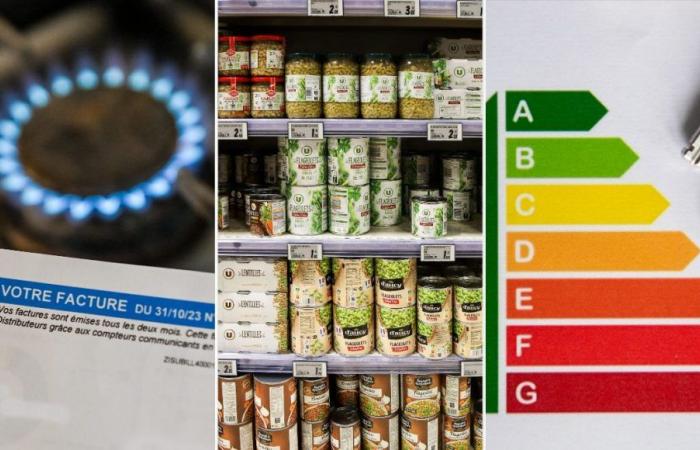At the start of each month there is a series of administrative changes, price variations and the entry into force of new measures. Overview of the small and big changes that will take place from Monday.
Gas price increase
The average price of the gas bill for millions of French people will increase by 11.7% in July compared to June. This increase represents an average of 124 euros more on the annual bill of French people who heat and cook with gas. This price is up compared to the June price but remains 3.5% lower than the average price of January 1, 2024.
This increase is mainly due to the four-year revaluation of the price of transporting gas to homes and businesses, in other words, the toll that the network manager GRDF charges to suppliers.
Fight against “shrinkflation”
Starting Monday, supermarkets will have to inform their customers when products on the shelves have seen their quantity drop without their price decreasingwhat is called “shrinkflation”. All supermarkets over 400 square meters in France will be required toaffix a “visible” and “legible” label or sign near, or even directly on the packaging, of all the products concerned.
“Shrinkflation” – from the English verb “to shrink” – consists, for manufacturers of consumer goods, agro-industrial or distributors, in reducing the quantities of products sold rather than significantly increasing prices, in a context where food prices have already increased by 20% in two years. This involves, for example, a lighter but more expensive packet of cereals.
Revaluation of unemployment benefits
Unemployment insurance benefits will be increased by 1.2% on July 1, indicated Unédic. This revaluation “would concern around 2 million compensated job seekers” out of some 2.7 million in total, according to a press release from the body jointly managed by trade union and employer organizations. Some beneficiaries of less than six months are not affected.
This revaluation “takes into account both the economic context and the financial balance of the unemployment insurance system”. Elle “comes after two others in 2023 (+1.9% on April 1, then +1.9% on July 1)”. A beneficiary who has not worked during the month and receives the minimum allowance will thus go from 979.29 euros gross to 991.07 euros gross, explains Unédic. The CGT has however denounced “the extreme weakness of this revaluation” and the CFDT expressed a “bitter disappointment“.
The government must also publish by July 1 the decree concerning the new controversial reform of unemployment insurancefor entry into force on December 1. It includes in particular a reduced period of compensation from 18 to 15 months, and the need to have worked eight months out of the last 20 months to be compensated (compared to six over the last 24 months currently).
Correction of the DPE calculation
Of the “simplifications” in the calculation of the new energy performance diagnosis (DPE) of a dwelling must come into force this Monday. Introduced in 2006, the DPE classifies dwellings from A to G according to their energy consumption and, since 2021, their impact on the climate. Faced with the “complexities” et “bias“calculation concerning small dwellings – less than 40 m2 -, the Minister of Ecological Transition Christophe Béchu announced in February a correction of the calculation, effective from July 1.
This modification should remove 140,000 homes from the energy sieve category (labels F or G). A change which is important since since January 1, 2023, the law has prohibited the rental of the most energy-intensive housing (classified G+) and this ban will be extended from January 1, 2025 to all housing classified G.
From Monday, “if you are concerned, you can download the certificate replacing the first page of your DPE for possible sale or rental”indicates the site of Ademe.
Opening of the new savings plan for young people
The “future climate savings plan”, open exclusively to under-21s, is in place from Monday. It should make it possible to dedicate part of French savings to financing low-carbon projects. This is part of the green industry law, the objective of which is to reindustrialize France while promoting decarbonization.
“Only one plan can be opened per natural person“and the payments are limited to 22,950 euros, specifies the government website.
A new delimitation of rural areas
The reform of “rural revitalization zones” (ZRR)renamed FRR, comes into force this Monday. Some 20,000 rural municipalities will be included in the new zoning, which opens the right to tax and social exemptions to support activity in rural areas. This system is often cited by elected officials as a way to attract medical and paramedical professions to rural areas.
The reform also creates two levels of zoning: FRR base and, for the quarter of municipalities that need it the most, a reinforced FRR plus level.
Slight increase in car and home insurance
Car and home insurance will increase by a few cents this Monday due toan increase in the “attack” tax. This tax, which helps finance the Guarantee Fund for victims of acts of terrorism and other offenses, will increase by 60 cents from 5.90 euros to 6.50 euros.






